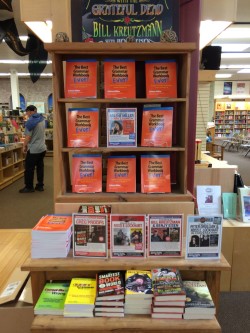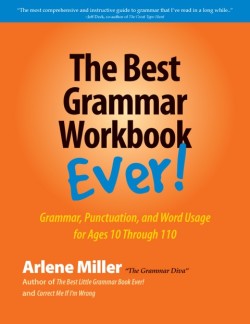 I am veering away from my usual type of posts this week to write something a bit more autobiographical — and a bit more promotional.
I am veering away from my usual type of posts this week to write something a bit more autobiographical — and a bit more promotional.
The last two posts in the 7 Deadly Sins of Grammar series will be coming the next two weeks. And thank you to those who have asked me what my post on plagiarism had to do with grammar. Good question. I think the series would have been more aptly titled the 7 Deadly Sins of Writing, and that is indeed what I may have had in mind in the first place. But on to this post . . .
Plans – As you may know, I am retiring this week (from teaching) after eleven years of teaching English at a junior high school. The past four years of those eleven I have been working part time–every other day–so that I could devote time to writing and marketing my books. I have managed, in the past five years, to publish three print grammar books, two of which are currently also e-books; two short grammar books only in e-book format; and a novel. I have many other books in the queue that I would like to write. Hopefully, I will now have more time. And if you are a writer, you know that writing is the easy part: promoting is forever! Perhaps I will have more time for that too. I will continue to copyedit both fiction and nonfiction, and teach workshops and give grammar/writing/language talks wherever I am invited. I may also return to teaching as a substitute next winter. And of course, the blog will continue with more grammar, language, and writing posts—along with guest posts.
Platform – If you have written and published a book (or been a contestant in the Miss America pageant), you know that you need a platform, whether you write fiction or nonfiction. A platform comprises your intent (what are you trying to say in your book) and your audience. For example, my platform is helping people communicate more effectively and feel more confident about their writing through avoiding common grammar , punctuation, and word usage errors. Let’s say I wrote a novel with child abuse, or women’s rights, or bullying in the plot. There is my platform.
It is also crucial to know your audience. Some audiences are easy. Gardening books are written for those who enjoy gardening. A book on beginning gardening might have an audience of people who think they would like to try gardening, but don’t know much about it. With a grammar book it is easy to say, “My audience is everyone. Everyone needs good grammar, right?” Well, first of all, not everyone is interested in grammar or buying a book on the topic. Often, My audience is everyone turns out to be My audience is no one. It is very difficult to market to everyone. An author might have one obvious niche, many niches, or may choose a niche (or more than one) to market to.
Promotion – Well, that was a nice lead-in to the audiences for my grammar workbook. I have had trouble focusing in on which markets to target with my grammar books because there are so many. I was thinking about the hordes of people who might rush to buy a grammar workbook at the beginning of the summer: I am going on the assumption that people like workbooks; they like taking tests and finding out how they did. Here are some of my audiences:
- Students from 10 through 18: My workbook is intended for anyone older than about 10. So a student in grades 6 through 12, let’s say, could go through the workbook during the summer and enter the next grade much more prepared to write (and do grammar in whatever capacity it is taught). So, motivated junior high and high school students are a good audience.
- College Students: Many college students are taking remedial writing courses when they reach college; and both colleges and businesses complain about the lack of writing ability of their students and employees. Quite a few professors have used my book for their college classes of various types, including creative writing. So, college students, whether for a class or just to brush up on their grammar (punctuation, and word usage too) are another good audience for me.
- Teachers: My students have come to me with varying degrees of grammar knowledge. Although it seems, in many cases, that grammar is not being taught very much these days, the new Common Core standards are full of grammar—and quite sophisticated concepts at early grades. I think part of the reason many teachers, particularly elementary school teachers, may not teach grammar much is because they are not too sure of some of the concepts themselves. If you don’t continue to use grammar, you may still use correct grammar, but you don’t remember why. I think teachers are an excellent audience for me.
- Homeschool teachers/parents: Many homeschool teachers are the parents. Once again, unless you continue to use grammar in the capacity of teaching it, or as an editor, you tend to forget the rules. The workbook is a great review for homeshool instructors.
- Job Hunters: If you need to write a cover letter, redo a resume, or begin interviewing, you need good writing and good speaking skills. A grammar review would be very helpful. And once you get the job, the book will continue to be helpful as a reference. Many people write a great deal in their jobs. I once did a workshop for accountants—number people—who told me that 90 percent of their job involved writing.
- Test takers: There are many types of test takers. Many people take some type of college entrance or graduate school exam including SAT, GRE, MSAT, LSAT, GMAT. They generality involve writing, and some of them may contain grammar, usage, and punctuation questions as well. But in addition to those tests, there are many occupations where you must pass a grammar test to get hired. I have heard of grammar tests for such unlikely jobs as police officer.
- Paralegals: I have had paralegals in my grammar classes. That is just one occupation where the comma has to be in the right place. And apparently attorneys are pretty fussy about this.
- Those who are not native English speakers: It goes without saying that nonnative speakers can use an English grammar book. And may I add that nonnative speakers generally have the best grammar and know the most about English grammar.
- College professors: All types of college classes require writing, so a grammar book is helpful; it doesn’t have to be a grammar class, or even a writing class.
- Schools (private, public): Public schools have restrictions on what they buy for students. Private schools have more leeway and also tend to teach more grammar. The private school market is likely a good one for my grammar workbook.
So am I asking all of you who fit into any of the above categories to buy my workbook? Just a suggestion! It helps me to actually write down my audiences and give reasons, because I do have one of those topics where I can say the audience is everyone. But of course it isn’t. (But it’s almost everyone, isn’t it?)
By the way, The Best Grammar Workbook Ever is available in print only right now. I am preparing to create an e-book, but I am wondering if perhaps just a PDF would do, since it keeps its pagination, unlike an e-book. So while I ponder this issue (and welcome comments from you), I will wish you a happy week!
For the next two weeks, I will be back with the last two installments of The 7 Deadly Sins of Grammar (much more appropriately called Writing) with Jargon and Slang, and Inconsistencies.




Leave a Reply